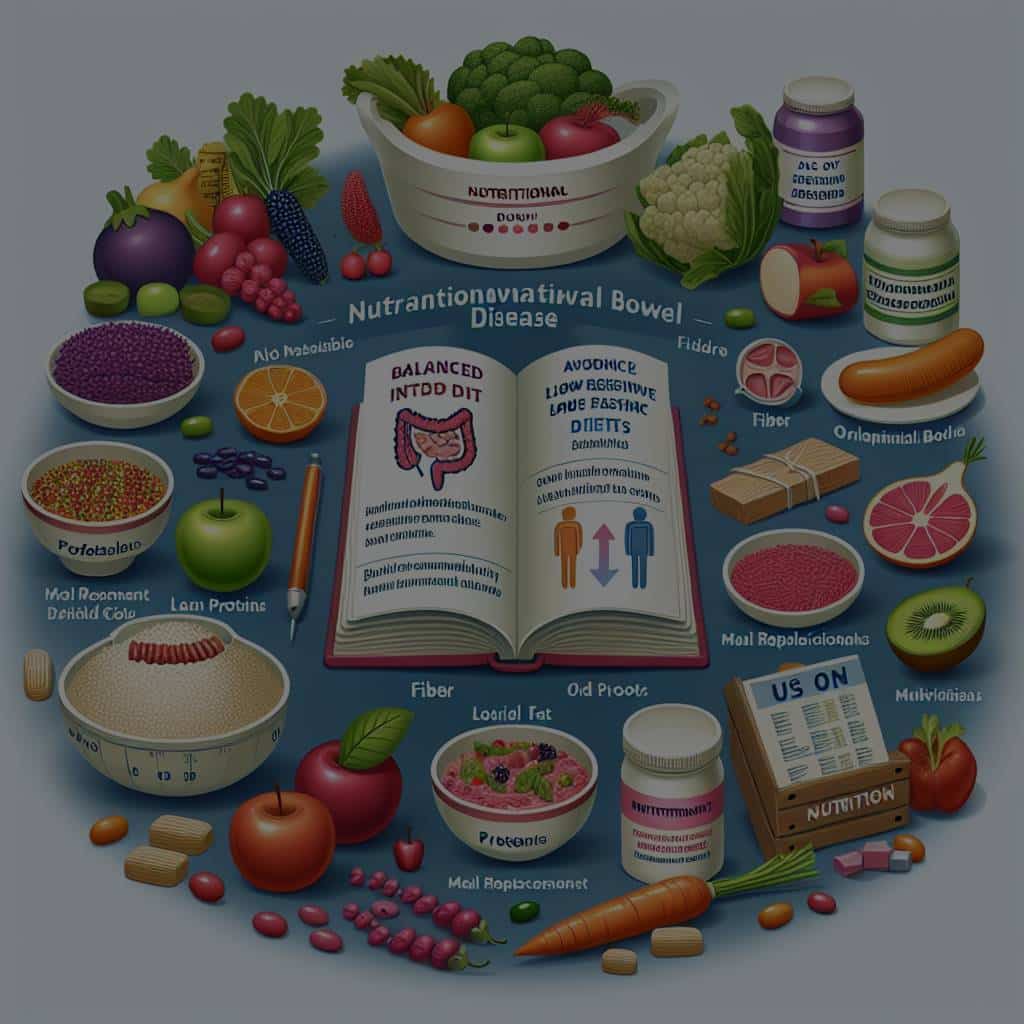What Nutritional Interventions Are Effective for Managing Inflammatory Bowel Disease?

Navigating the complex relationship between diet and Inflammatory Bowel Disease (IBD) can be challenging. With an upsurge in clinical studies linking nutrition to disease remission, a growing number of patients are turning towards dietary interventions. This article seeks to shed light on the most effective nutritional strategies for managing IBD, with a specific focus on Crohn’s disease.
The Role of Nutrition in IBD Management
Understanding the role of diet in managing IBD is no small task owing to the intricacies associated with the disease. IBD, which includes conditions such as Crohn’s disease and ulcerative colitis, is characterized by chronic inflammation of the bowel. Dietary habits can influence the disease course, either exacerbating or relieving symptoms.
A lire en complément : What Are the Health Implications of Microplastics in Drinking Water?
Research indicates that certain foods can trigger inflammatory responses while others might have anti-inflammatory properties. Consequently, it is crucial for patients to understand their body’s specific responses to different foods. Though there is no one-size-fits-all dietary plan for IBD, clinical research suggests that some dietary strategies are more effective than others in managing the disease.
The Efficacy of Enteral Nutrition
One nutritional approach that has gained significant clinical recognition in IBD management is enteral nutrition (EEN). Enteral nutrition involves the consumption of a liquid diet, which provides all the essential nutrients required by the body. This diet is often administered through a tube, especially in severe cases.
Avez-vous vu cela : How to Cultivate Emotional Intelligence in Healthcare Professionals for Better Patient Care?
In a 2016 scholarly study, over 80% of pediatric Crohn’s patients experienced remission after eight weeks of EEN therapy. Furthermore, research shows that EEN can also help maintain remission in adult patients.
The precise mechanism through which EEN works is still under investigation. However, it’s believed that this dietary intervention helps to reduce inflammation in the bowel by modulating the gut microbiome. While EEN has demonstrated promising results, it is important to note that the liquid diet can be challenging to adhere to for a long period. Besides, it may not be suitable for all patients.
Role of Specific Foods in Managing IBD
Aside from EEN, certain foods and dietary patterns have been associated with improved IBD symptoms. For instance, the Mediterranean diet — rich in fruits, vegetables, legumes, and olive oil, but low in red meat and processed foods — has been associated with a lower risk of IBD.
A clinical study published in the Journal of Crohn’s and Colitis found that patients following a Mediterranean diet reported fewer disease flares and better quality of life. It’s believed that the high fiber content and the anti-inflammatory properties of the foods in this diet contribute to its beneficial effects.
In addition to the Mediterranean diet, the Specific Carbohydrate Diet (SCD) and the low FODMAP (Fermentable Oligosaccharides, Disaccharides, Monosaccharides, and Polyols) diet have also been studied for their potential benefits in managing IBD. Both diets eliminate certain carbohydrates that are believed to exacerbate IBD symptoms.
However, while some patients report symptom relief on these diets, further research is needed to establish their long-term efficacy and safety. These diets can be quite restrictive and may require guidance from a dietitian to ensure nutritional adequacy.
Tailoring Nutritional Interventions to Individual Patients
Given the complexity and variability of IBD, it is crucial to tailor nutritional interventions to individual patients. Factors such as the specific type of IBD, disease severity, and individual food tolerances should be taken into account.
Some patients with IBD may have specific nutritional deficiencies due to malabsorption or increased nutrient needs. Iron, vitamin B12, and vitamin D deficiencies are common in IBD patients. In these cases, dietary supplementation might be necessary.
Furthermore, it’s important to consider the patient’s lifestyle and dietary preferences when planning a nutritional intervention. A diet that is not palatable or feasible for a patient to follow will not be effective in the long run.
The Importance of Dietitian Involvement in IBD Management
Given the complexity of diet-disease interactions and the potential risk of nutritional deficiencies, the involvement of a dietitian in IBD management is crucial. Dietitians can provide evidence-based dietary advice, monitor nutritional status, and guide dietary modifications.
Moreover, dietitians can play a pivotal role in helping patients navigate the plethora of nutrition information and advice available online, much of which can be misleading or incorrect.
Collaboration between patients, dietitians, and medical professionals can help to develop individualized dietary strategies that are not only scientifically sound but also consider the patient’s personal preferences and lifestyle. This multidisciplinary approach can help to optimize the management of IBD and improve the quality of life for patients.
While diet alone cannot cure IBD, it can play a significant role in managing symptoms and improving the quality of life for patients. A better understanding of the relationship between diet and IBD can help to guide more effective and personalized nutritional interventions. And although more research is needed in this field, it is evident that diet plays a crucial role in IBD management.
Nutritional Supplements and Inflammatory Bowel Disease
The area of nutritional supplementation in managing Inflammatory Bowel Disease (IBD) continues to gain interest. This is particularly true for patients diagnosed with Crohn’s disease, where malnutrition and vitamin deficiencies are common due to the inflammation and damage in the digestive tract.
Notably, iron, vitamin B12, and vitamin D deficiencies are frequently observed among IBD patients. A study accessible on Google Scholar pointed out that low levels of these vital nutrients can contribute to increased disease activity and decreased quality of life. Therefore, regular monitoring and supplementation as required could be vital in managing IBD.
Iron deficiency, for example, can lead to anemia, causing symptoms like fatigue and weakness. Thus, iron supplementation could be beneficial. However, it’s crucial to note that high doses may trigger IBD flare-ups. This is where professional advice becomes essential.
Vitamin B12 is primarily absorbed in the terminal ileum, a part of the bowel often affected by Crohn’s disease. Deficiency can cause neurological symptoms and anemia. In severe cases, B12 injections may be needed.
Insufficient Vitamin D levels, which are common in IBD patients, could exacerbate symptoms since it plays a role in regulating the immune system and has anti-inflammatory effects. Several studies, such as one found on Scholar Crossref, have suggested that supplementation could reduce disease activity.
However, while supplementation can help manage nutritional deficiencies, it should not replace a balanced diet. Furthermore, it’s important to remember that excessive intake of certain vitamins and minerals could have negative effects. Therefore, supplementation should always be under the guidance of a healthcare professional.
The Impact of Lifestyle Factors on IBD
The impact of lifestyle factors on IBD is becoming increasingly recognized. Stress, for example, has been linked to exacerbated disease activity in both Crohn’s disease and ulcerative colitis.
Stress management techniques like meditation, yoga, and cognitive-behavioral therapy might help to manage IBD symptoms. Regular physical activity can also have a positive effect, with a study available on Google Scholar indicating that moderate exercise could lower inflammation and promote gut health.
Sleep is another crucial factor. A lack of quality sleep can potentially worsen IBD symptoms, as poor sleep has been associated with increased inflammation in the body. Therefore, addressing sleep quality might be an essential part of a comprehensive approach to managing IBD.
It’s also worth noting the potential impact of alcohol and smoking on IBD. Both have been linked to increased disease activity in Crohn’s disease and ulcerative colitis. Patients with IBD are generally advised to limit alcohol intake and avoid smoking.
However, it’s important to remember that lifestyle changes should complement, not replace, medical treatment. Furthermore, these changes should be personalized to each patient’s specific needs and circumstances.
Conclusion
Understanding the role of diet and lifestyle in managing Inflammatory bowel disease (IBD) is essential for patients and healthcare professionals alike. Nutritional interventions like the Mediterranean diet, low FODMAP diet, and enteral nutrition are showing promising results in managing disease symptoms and improving the quality of life for patients. Meanwhile, nutritional supplementation can address common deficiencies observed in IBD patients, and addressing lifestyle factors like sleep, physical activity, and stress can further contribute to disease management.
However, it’s important to remember that dietary interventions and lifestyle changes should complement, not replace, medical treatment. Also, these approaches should be tailored to each patient’s specific needs and circumstances.
The involvement of a dietitian, along with a multidisciplinary healthcare team, can be instrumental in developing individualized strategies that work best for each patient. While more research needs to be conducted in this field, the current evidence clearly indicates that diet and lifestyle have a crucial role in managing IBD.
